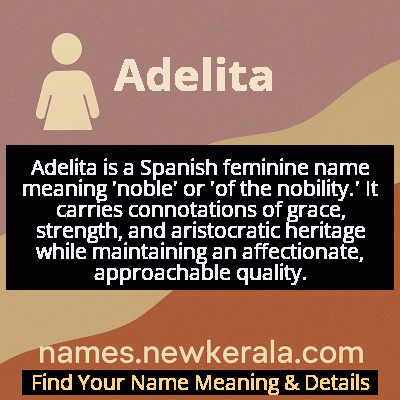Adelita Name Meaning & Details
Origin, Popularity, Numerology Analysis & Name Meaning of Adelita
Discover the origin, meaning, and cultural significance of the name ADELITA. Delve into its historical roots and explore the lasting impact it has had on communities and traditions.
Name
Adelita
Gender
Female
Origin
Spanish
Lucky Number
7
Meaning of the Name - Adelita
Adelita is a Spanish feminine name meaning 'noble' or 'of the nobility.' It carries connotations of grace, strength, and aristocratic heritage while maintaining an affectionate, approachable quality.
Adelita - Complete Numerology Analysis
Your Numerology Number
Based on Pythagorean Numerology System
Ruling Planet
Neptune (Ketu)
Positive Nature
Intuitive, analytical, spiritual, and inquisitive.
Negative Traits
Secretive, reserved, aloof, and can be overly critical.
Lucky Colours
Green, yellow.
Lucky Days
Monday.
Lucky Stones
Cat’s eye, moonstone.
Harmony Numbers
1, 5, 6.
Best Suited Professions
Scientists, researchers, spiritual leaders, detectives.
What People Like About You
Depth of knowledge, analytical skills, spirituality.
Famous People Named Adelita
Adelita del Campo
Revolutionary Soldier
Legendary female soldier during Mexican Revolution, symbol of women's participation
Adelita Gabilondo
Educator and Feminist
Established schools for underprivileged girls and advocated for women's rights
Adelita Gallardo
Singer
Preserved and performed traditional Mexican corridos and folk music
Adelita San Miguel
Community Leader
Influential organizer in Latino communities in the United States
Name Variations & International Equivalents
Click on blue names to explore their detailed meanings. Gray names with will be available soon.
Cultural & Historical Significance
Beyond its revolutionary associations, Adelita embodies the cultural values of nobility, grace, and strength in Hispanic communities. The name carries echoes of medieval European nobility through its Germanic roots ('adal' meaning noble), while its diminutive '-ita' suffix gives it an affectionate, approachable quality in Spanish. This combination of noble origins and everyday warmth makes Adelita a name that bridges social classes and historical periods, representing both aristocratic heritage and popular revolutionary ideals. It continues to be celebrated in Mexican festivals, folk music, and cultural commemorations as a symbol of feminine strength and cultural identity.
Extended Personality Analysis
Women named Adelita are often perceived as possessing a unique blend of strength and compassion, reflecting the name's dual heritage of nobility and revolutionary spirit. They typically exhibit natural leadership qualities, confidence, and a strong sense of justice, coupled with genuine warmth and emotional intelligence. These individuals tend to be resilient in facing challenges, yet maintain a graceful and dignified demeanor even under pressure. Their noble character manifests not as arrogance, but as a deep-seated integrity and commitment to helping others.
Adelitas are often described as having a magnetic personality that draws people to them, combining traditional values with progressive thinking. They possess excellent communication skills and the ability to inspire others, making them effective in both personal relationships and professional settings. Their revolutionary namesake lends them a sense of courage and determination, while the affectionate diminutive form suggests approachability and emotional warmth. This combination creates individuals who are both respected and beloved, capable of leading change while maintaining strong community connections and family ties, embodying the perfect balance between strength and sensitivity.
Modern Usage & Popularity
In contemporary times, Adelita maintains steady popularity in Spanish-speaking communities, particularly in Mexico and among Hispanic populations in the United States. While not among the top 100 most popular names, it enjoys consistent usage as a classic choice that honors cultural heritage. The name has seen a mild resurgence in recent years as parents seek names with historical significance and strong cultural roots, particularly those that celebrate women's strength and contributions to history. Modern Adelitas often benefit from the name's unique position as both traditional and distinctive, avoiding the overuse of more common Spanish names while maintaining cultural authenticity. The name is particularly favored by families with connections to Mexican history or those who value names with strong feminist and revolutionary connotations, serving as a living tribute to women's resilience and cultural pride.
Symbolic & Spiritual Meanings
Adelita symbolizes the intersection of nobility and revolution, representing both aristocratic heritage and popular uprising. The name embodies the concept of 'noble rebellion' - the idea that true nobility involves standing up for justice and the oppressed. Symbolically, it represents feminine strength that is both gentle and formidable, much like the revolutionary women who fought with both compassion and courage. The name also carries connotations of cultural preservation and identity, serving as a living connection to Mexican history and traditions. In a broader sense, Adelita symbolizes the power of ordinary people to achieve extraordinary things, the importance of remembering historical struggles, and the enduring strength of cultural identity across generations. It represents the ideal of leadership that serves the people rather than dominates them, and the beautiful paradox of strength wrapped in gentleness.

